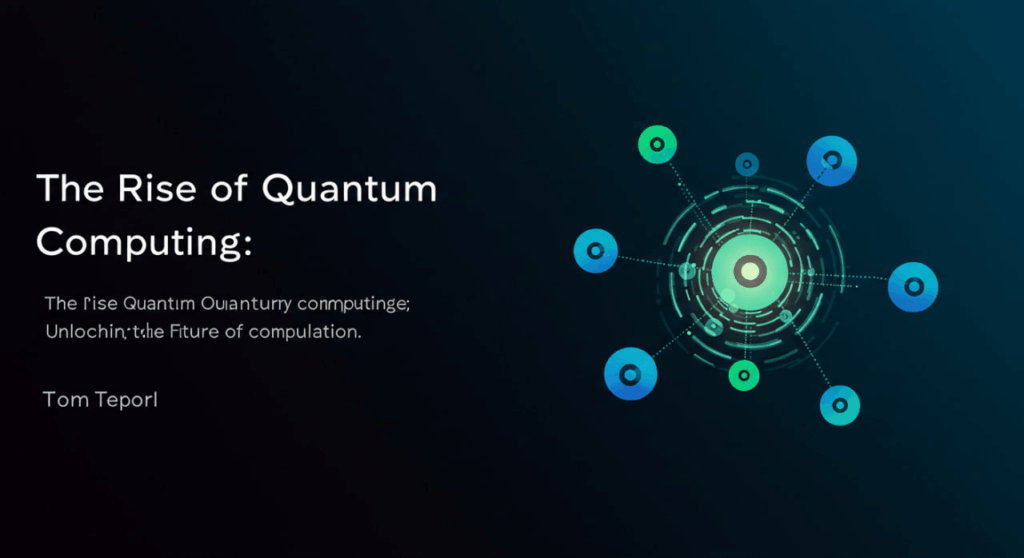Quantum computing represents one of the most transformative technologies on the horizon, promising to solve problems that are currently impossible for classical computers. Unlike traditional computing, which relies on bits that represent either 0 or 1, quantum computing uses quantum bits, or qubits, that can exist in multiple states simultaneously thanks to principles like superposition and entanglement. This article dives into the fundamentals, real-world applications, challenges, and practical steps for individuals and businesses to get involved, providing actionable insights to demystify this complex field.
Understanding the Basics of Quantum Computing
At its core, quantum computing leverages the weird and wonderful rules of quantum mechanics to perform calculations at unprecedented speeds. To grasp this, consider how classical computers process data sequentially, like flipping through pages in a book one by one. Quantum computers, however, can “read” multiple pages at once due to superposition, where a qubit can be both 0 and 1 until measured.
Key Quantum Principles Explained
- Superposition: This allows qubits to represent numerous possibilities simultaneously, exponentially increasing computational power. For example, while 3 classical bits can represent 8 states one at a time, 3 qubits can handle all 8 states in parallel.
- Entanglement: Qubits can become linked so that the state of one instantly influences another, no matter the distance. This enables faster information processing and is key to quantum algorithms like Shor’s for factoring large numbers.
- Quantum Interference: By manipulating probabilities, quantum systems amplify correct answers and cancel out wrong ones, making computations more efficient.
These principles aren’t just theoretical; they’ve been demonstrated in labs since the 1990s, with companies like IBM and Google pushing boundaries through prototypes.
How Quantum Hardware Works
Quantum computers require specialized hardware, such as superconducting circuits cooled to near absolute zero to minimize errors from environmental noise. Ion traps and topological qubits are other approaches being explored for stability. For instance, Google’s Sycamore processor achieved “quantum supremacy” in 2019 by solving a problem in 200 seconds that would take a supercomputer 10,000 years—though debates continue on its practical value.
Real-World Applications and Industry Impacts
Quantum computing isn’t science fiction; it’s already influencing sectors by tackling optimization, simulation, and cryptography challenges. Here’s how it’s providing value today and tomorrow.
Revolutionizing Drug Discovery and Healthcare
In pharmaceuticals, quantum simulations can model molecular interactions at an atomic level, accelerating drug development. Traditional methods might take years to simulate a protein’s folding; quantum algorithms could reduce this to hours. Actionable tip: Researchers can access cloud-based quantum platforms like IBM’s Qiskit to prototype simulations without owning hardware. For businesses, partnering with quantum startups could cut R&D costs by 30-50% in the next decade.

Enhancing Financial Modeling and Risk Analysis
Finance relies on complex models for portfolio optimization and fraud detection. Quantum algorithms like Grover’s search can sift through vast datasets faster, identifying patterns in real-time. Banks like JPMorgan are experimenting with this for option pricing. Practical advice: If you’re in finance, start by learning quantum-inspired algorithms on classical hardware via libraries like Pennylane, which bridge the gap until full quantum systems mature.
Boosting Materials Science and Climate Modeling
Quantum computers excel at simulating quantum systems, aiding the design of new materials for batteries or superconductors. In climate science, they could model atmospheric dynamics more accurately, improving predictions. For example, optimizing carbon capture processes could be game-changing. Individuals interested can contribute via open-source projects on GitHub, simulating quantum chemistry with tools like Psi4.
Challenges and Ethical Considerations
Despite the hype, quantum computing faces hurdles that must be addressed for widespread adoption.
Technical Barriers
- Error Rates and Decoherence: Qubits are fragile; even slight disturbances cause errors. Current systems need thousands of error-correcting qubits for reliable computation.
- Scalability: Building machines with millions of qubits is a massive engineering challenge. As of 2025, the largest systems hover around 1,000 qubits, far from the millions needed for complex tasks.
To overcome these, invest in education: Online courses from Coursera or edX on quantum error correction can equip you with skills for emerging jobs.
Security and Ethical Implications
Quantum computers threaten current encryption, as Shor’s algorithm could crack RSA keys. This has spurred post-quantum cryptography efforts by NIST. Ethically, unequal access could widen global divides—governments must ensure equitable development. Actionable step: Businesses should audit their encryption now and transition to quantum-resistant algorithms like lattice-based cryptography.
Getting Started with Quantum Computing
You don’t need a PhD to engage with quantum tech. Here’s a step-by-step guide:
- Learn the Fundamentals: Start with free resources like Microsoft’s Quantum Development Kit or books such as “Quantum Computing for Everyone.”
- Experiment Hands-On: Use cloud services from Amazon Braket or Rigetti to run simple quantum circuits without hardware.
- Join Communities: Participate in forums like Quantum Computing Stack Exchange or attend virtual meetups to network.
- Apply in Your Field: Identify a problem in your industry (e.g., logistics optimization) and model it quantum-style using hybrid classical-quantum approaches.
- Stay Updated: Follow advancements via journals like Nature Quantum Information, especially with rapid progress expected by 2030.
By 2025, hybrid systems combining classical and quantum elements are becoming mainstream, offering immediate value in optimization tasks.
FAQ
What is the difference between quantum and classical computing?
Classical computing uses bits for sequential processing, while quantum uses qubits for parallel computations via superposition and entanglement, enabling exponentially faster solutions for specific problems.
Is quantum computing accessible to non-experts?
Yes! Cloud platforms like IBM Quantum Experience allow anyone to experiment with real quantum hardware through user-friendly interfaces and tutorials.
When will quantum computers be practical for everyday use?
While prototypes exist, full-scale practical applications are projected for the late 2020s to 2030s, starting with niche industries like pharmaceuticals and finance.
How does quantum computing affect cybersecurity?
It could break current encryption methods, but new quantum-safe standards are in development. Organizations should prepare by adopting hybrid encryption strategies now.
Can I build my own quantum computer at home?
Not yet—quantum hardware requires extreme conditions like ultra-low temperatures. However, you can simulate quantum systems on personal computers using software like Q# or Cirq.
What jobs are emerging in quantum computing?
Roles include quantum software engineers, algorithm developers, and hardware specialists. Skills in Python, linear algebra, and physics are highly valued, with salaries often exceeding $150,000 annually.



